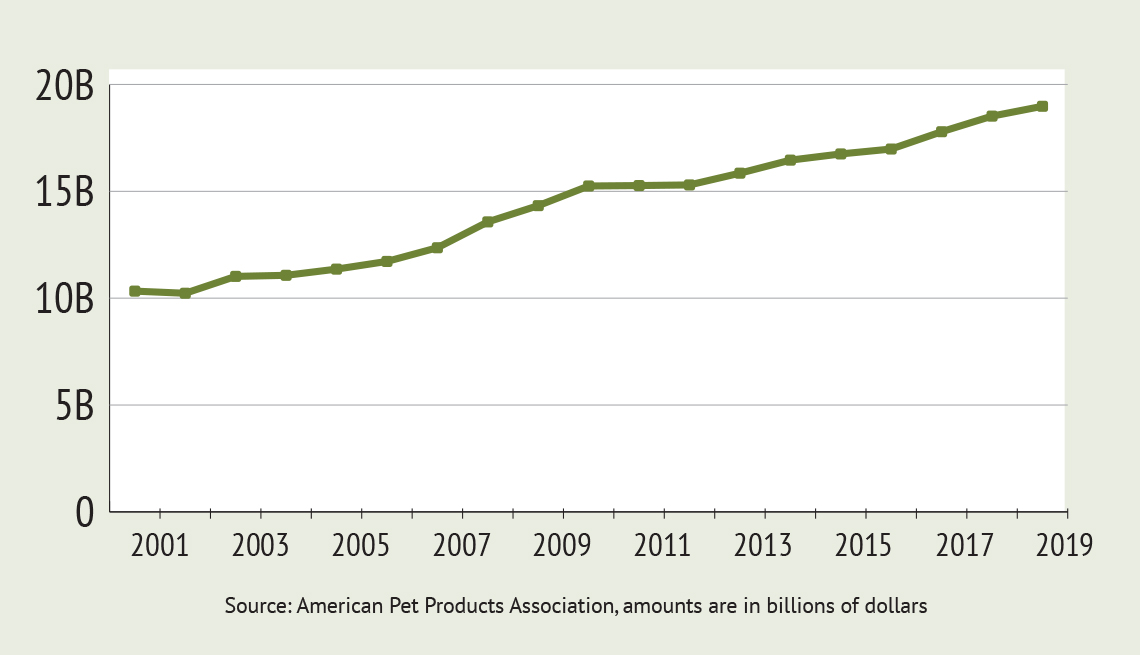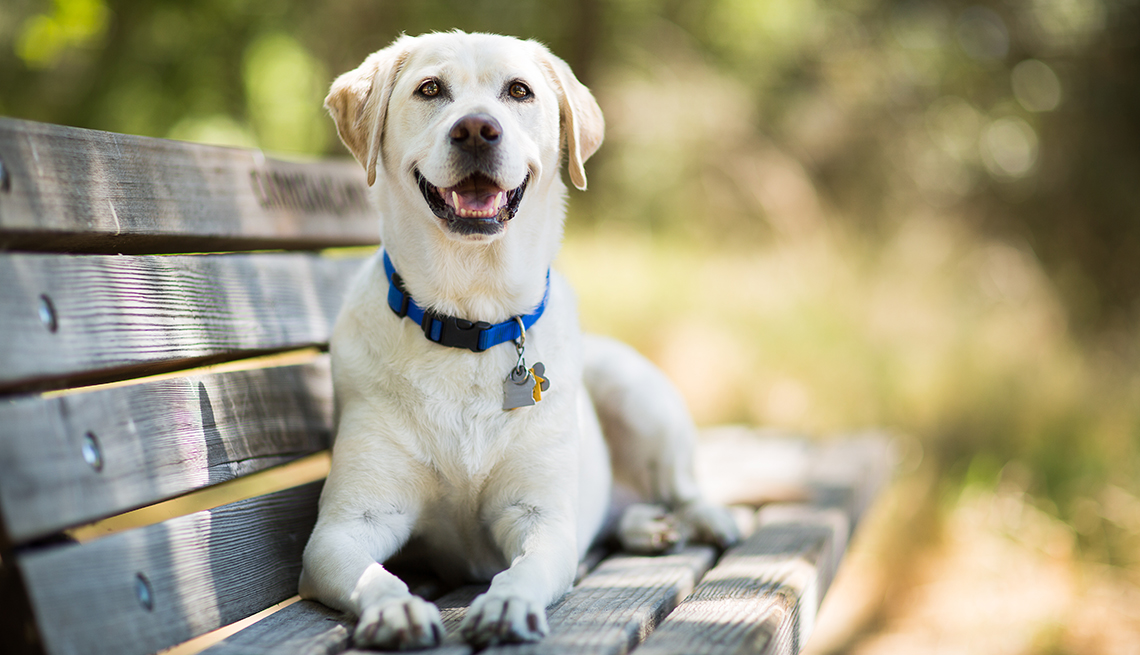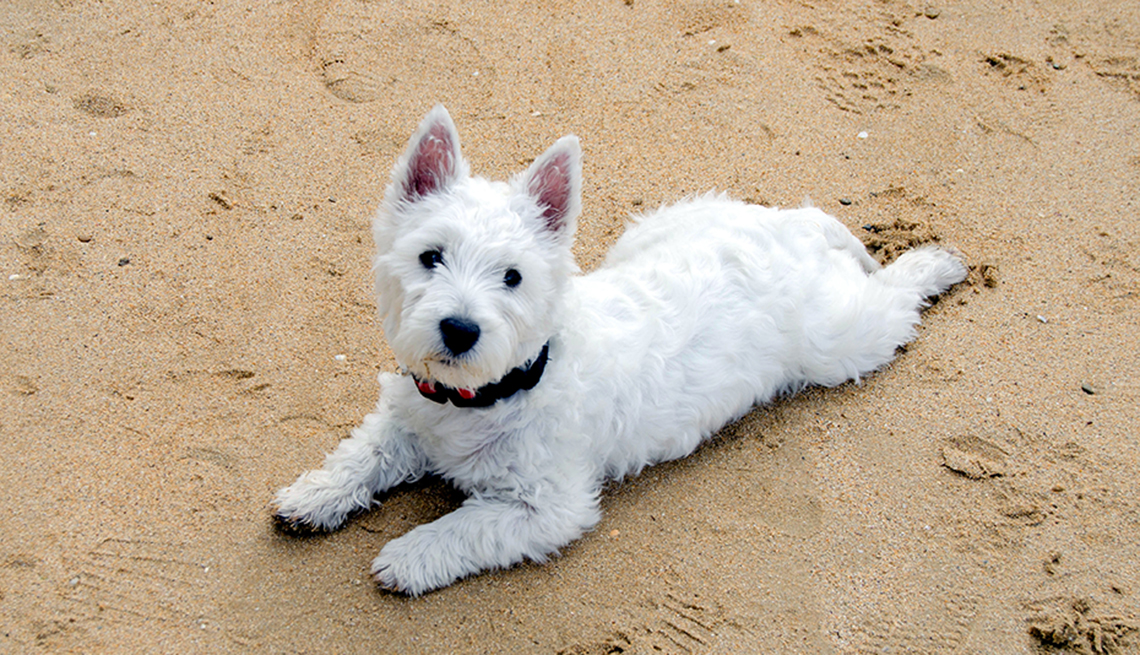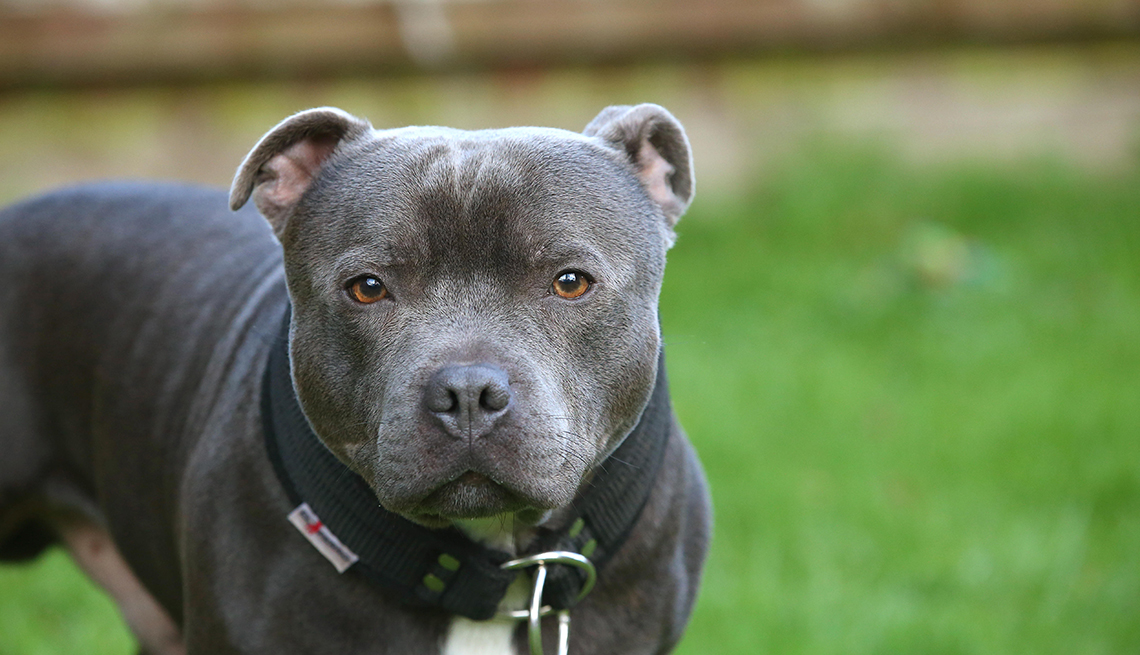How to Keep Your Veterinary Bills Down
The care you need to keep your aging dog or cat healthy
En español | The ailments that dogs and cats encounter as they age can mirror those of humans.
Many are living longer, like their owners, thanks to medical advances and healthier lifestyles. And pets, like people, may put on unneeded pounds, lose muscle mass, develop diabetes, suffer from arthritis and experience a kind of cognitive decline similar to Alzheimer's disease.
Human and veterinary health care costs have soared in recent years, both spurred on by such forces as leaps in technology and pricey end-of-life care. Americans spent nearly $19 billion for veterinary care in 2019, up 84 percent since 2001, according to an industry group's data that AARP adjusted for inflation.
In fact, health care spending for pets jumped 60 percent between 1996 and 2012 while such spending for people rose less than 50 percent, one study found.
With rising costs, pet owners face the same hard choices that they do in their own medical care. What items — blood tests, checkups, vaccinations — do senior dogs and cats really need?
Vet visits good for early detection
AARP asked veterinary experts around the country, reviewed studies and looked at guidelines with these results:
• More frequent exams. Aging pets, those in the last 25 percent of their estimated life span, should have a physical exam at least every six months, twice as often as younger animals.
• Not-so-frequent shots. Vaccinations typically are not needed more often than every three years. So-called core or vital vaccines for cats are for herpesvirus type 1, panleukopenia, calicivirus and rabies, according to American Veterinary Medical Association (AVMA) guidelines.
Core vaccines for dogs are a combination vaccine against canine distemper virus, adenovirus type 2 and parvovirus (with or without parainfluenza virus) and rabies. Annual leptospirosis vaccines may be advised for dogs at risk, the AVMA says.
• Some pills necessary. Medication may aid with some conditions linked with aging, such as hyperthyroidism in cats and hypothyroidism in dogs.
Twice-a-year vet visits allow for key preventive care, experts said.
"One rectal exam can save a life by catching a mass early,” said veterinarian Alison Mason, medical director at the VCA Hope Animal Hospital in Brooklyn, New York.
Cats’ senior years begin around age 11. Dogs vary widely; small dogs may be senior at age 11, large dogs at 6 years old.
"The difference can be a factor of two. A Maltese may live 15 years. A Great Dane may live six, seven, eight,” said Kate Elizabeth Creevy, a specialist in dog aging and associate professor at the Texas A&M University College of Veterinary Medicine & Biomedical Sciences in College Station.
Talk candidly about costs
To ensure that pets age gracefully, owners should hunt down a vet they can trust, said Brian Collins, faculty veterinarian at the Cornell University College of Veterinary Medicine in Ithaca, New York. The veterinarian should explain the reasons certain tests are needed and give families time to think about it, even if that means pausing to weigh the costs, figuring out finances and making another appointment.
That's welcome advice in an era when consumers face potentially steep bills for canine diagnostic tests, from as much as $150 for an X-ray to as much as $3,500 for a dog MRI with anesthesia. But retaining a longtime neighborhood vet may be hard in a time of rapid consolidation.
Many smaller veterinary hospitals are selling to large firms such as Banfield Pet Hospital and VCA Antech, both now owned by a subsidiary of Mars Inc. that has its headquarters in McLean, Virginia. The same company is known for M&Ms and Mars Bars, and its Mars Petcare subsidiary manufactures more than a half dozen brands of cat and dog food including Iams, Nutro and Whiskas.
Some vets may remain at the businesses after they're sold. Still, some worry that this trend can lead to cookie-cutter corporate medicine. Others say it means better-financed practices, according an AVMA article.
An estimated 3,500 to 4,000 “large/consolidated practices” are operating nationwide, AVMA spokesperson Catlin Ulrich wrote in email. They include practices that corporations or private equity firms have bought as well as new practices those larger groups have opened.
Ask these questions about care
Whether at a one-person veterinary clinic or a national chain, pet owners should feel free to press their vets for answers, experts said.
Natasha Olby, a professor of neurology and neurosurgery at North Carolina State University College of Veterinary Medicine in Raleigh, where she holds a distinguished chair in gerontology, suggests specific questions:
• Why do you want to run this test?
• Which diseases are you most concerned about, and are they treatable?
• How would you treat them, and what would the outcome be with and without that treatment?
Two serious neurological diseases in older dogs are similar to human illnesses.
One is canine cognitive dysfunction (CCD), the equivalent of Alzheimer's disease. Symptoms can include soiling the house, anxiety and altered sleep cycles causing disturbed sleep at night, Olby said in an email. Those dogs may become disoriented.
"If they get under a table, they might be confused about how to get out from between the chair legs,” she wrote.
The other is degenerative myelopathy, a progressive disease of the spinal cord that begins with weakness in the hind legs and is similar to amyotrophic lateral sclerosis in humans.
As cats and dogs age, they may experience muscle atrophy, or muscle loss, and eat less. That's the biggest concern among customers of Amy Cross, longtime part owner of MadCat, a Madison, Wisconsin, pet supply store. She advises them to test different foods, she said.
"At some point, it's just, ‘Let's get something that they'll eat.’ Different textures, adding chicken broth, warm water,” Cross said.
Keep them moving
For both aging dogs and cats, Collins at Cornell recommends what veterinarians call environmental enrichment.
"Play with them. Make sure they're getting exercise,” he said. He urges that owners practice preventive care, which he said can reduce veterinary costs as pets age.
For instance, obesity can promote diabetes in cats and increase the potential of arthritis in both cats and dogs, he said.
Like humans, pets can grow obese from overeating and lack of exercise. In 2018, 60 percent of cats and 56 percent of dogs were overweight or obese, according to the Association for Pet Obesity Prevention, based in Ocean Isle Beach, North Carolina.
Owners can help ward off serious dental problems in older dogs, such as extractions, through regular toothbrushing when they're young as well as veterinary cleaning under anesthesia, Collins said.
For brushing, they can use an old human toothbrush, a new adult or child toothbrush, or one designed for animals. They should use pet toothpaste — “pets appreciate the flavorings” — and avoid human toothpaste because of its fluoride, Collins said.
Brushing only takes a minute or two, he said, and even cats will tolerate it if started when they're young.
"I brush my dogs’ teeth every day,” he said. “And they actually get to looking forward to it."
Deborah Schoch is an independent journalist who helped found the California Health Care Foundation's California Center for Health Reporting at the University of Southern California. Earlier, she worked for 18 years at the Los Angeles Times.
These tests, diets raise red flags
Some pet testing and diets may not do what their advertising claims:
• Allergy tests. Certain commonly used blood and saliva tests for food allergies in dogs led to significant overdiagnosis in a study reported in a 2019 journal article. All 30 dogs tested positive for at least one allergy, and the study authors instead endorsed withholding one type of food at a time under a vet's supervision to see if a dog's allergy symptoms disappear.
• Nutrient tests. Other unnecessary, useless tests include “nutrition response testing” and a “nutritional blood test,” Cailin R. Heinze, a board-certified veterinary nutritionist and adjunct associate professor at Cummings School of Veterinary Medicine at Tufts University in Grafton, Massachusetts, wrote in email: “There are no simple blood tests to determine whether a pet is getting too little or too much of most nutrients."
• Grain-free diets. Many pet food companies advertise products as “grain free,” even though most pets with allergies have problems with proteins, not grains. They also tout their gluten-free pet diets, although pet gluten allergies are rarities, according to Tufts experts.
Also be aware that the federal Food and Drug Administration continues to investigate potential links between grain-free food and enlargement of the heart in dogs, which can be fatal.
• Genetic testing. Despite well-known flaws, genetic pet testing is a bustling business online. Owners of an aging pug with bladder problems bought a $65 genetic test online that showed it carried a mutation for a serious neurodegenerative disease, the journal Nature reported. So the owners had their 13-year-old dog euthanized, not realizing that as few as 1 in 100 dogs with this common mutation actually develop the rare disease. Easier-to-treat ailments also could have caused the dog's symptoms.
One testing company chief executive told USA Today that such testing can save dogs’ lives, but experts say regulations are almost nonexistent.
Dogs with the longest, shortest lifespans
This list includes the 25 breeds with more than 50 deaths in 2014 among almost 5,700 deceased dogs in the United Kingdon Kennel Club, which recognizes more than 220 breeds.
- |
- Photos

















